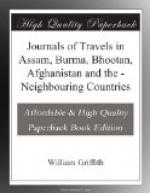“The country is disturbed, and one can only stir out in the valley itself close to camp, which is the more tantalizing as the mountains are accessible, and covered with forest. Our halt here should put us in possession of much information respecting these forests. As it is, I shall leave probably as wise as I came, except in having ascertained that the change from the well-wooded Himalaya mountains to those of the Hindoo-koosh, without even a shrub five feet high, takes place to the east of this. My employment is surveying and collecting data for ascertaining the heights of the hills around. But wherever I turn, the question suggests itself, what business have I here collecting plants, with so many in Calcutta demanding attention? How I am living! alone, without a table, chair, wine, or spirits, with a miserable beard, and in native clothes! but one thus saves much time; how unfortunate that mine now is not worth saving!
“I have been reading Swainson’s volumes in Lardner’s Cyclopaedia, in which there is a little to which severe critics may object, but a vast deal more that is beautifully sound. I am quite certain I never appreciated them before. How wonderful that no one before Macleay and Swainson thought that living beings were created on one plan. I have imbibed all the important parts with the hope of bringing them to bear on Botany, which is in a shameful state. One talks of the typical nature of polypetalous or monopetalous plants; another ridicules the idea, because as he wisely says, some polypetalous plants are monopetalous, and vice versa!! he objects, in fact to what constitutes the great value of a character, its mode of variation. All Swainson’s propositions appear to me philosophical and highly probable, but none of the present generation have eyes young enough to bear such a flood of light as he has thrown upon them. There are faults I acknowledge, but a man who writes for money does not always write for fame; rapid writing and much more rapid publishing is a vast evil, but one which is too often unavoidable. I have four or five drawings of fish, one of the spotted carnivorous carp, the most carnivorous type of all except Opsarion, and perhaps a new subgenus; {0b} one of the Sir-i-Chushme and Khyber Oreinus, and a Perilamp with two long cirrhi on the upper lip. I intend in my travels now I am alone, to stop at every fertile place. I am ascertaining the limit of the inferior snow in these latitudes, which I fancy will be 3,500 feet. Is it not curious that here 1,000 feet above Jallalabad we have had no snow, while at Jallalabad there has been abundance. I attribute it to the narrowness of the valley at this place, and to the forest. When I glance at the subject of botanical geography, how astounding appears our ignorance! we have no data, except to determine the mere temperature and amount of rain yet men will persist in the rage for imperfect description of undescribed species, and pay no attention to what is one of the most important agents in preserving things as they are in our planet,—i.e. vegetation. On this point Swainson is less happy than on others when he ascribes such importance to temperature, and points out the fact that countries in the same latitudes, and having the same temperatures, produce different animals.”




